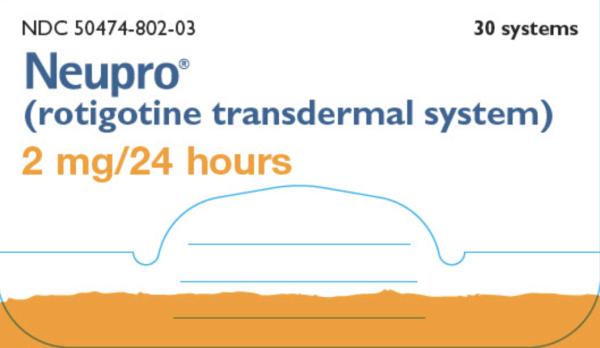Neupro Disease Interactions
There are 5 disease interactions with Neupro (rotigotine).
Dopamine agonists (applies to Neupro) hypotension
Moderate Potential Hazard, Moderate plausibility.
Dopamine agonists may impair the systemic regulation of blood pressure, with resultant orthostatic hypotension at any time, but especially during dose escalation. Additionally, patients with Parkinson's disease may have an impaired capacity to respond to an orthostatic challenge. For these reasons, patients with Parkinson's disease (or restless legs syndrome) who are being treated with dopaminergic agonists typically require careful monitoring for signs/symptoms of orthostatic hypotension, especially during dose escalation, and should be advised of this risk.
References (14)
- (2022) "Product Information. Inbrija (levodopa)." Acorda Therapeutics, DailyMed
- (2025) "Product Information. Apokyn (apomorphine)." US WorldMeds LLC, SUPPL-25
- (2025) "Product Information. Onapgo Prefilled Cartridges (apomorphine)." US WorldMeds LLC
- (2023) "Product Information. Gocovri (amantadine)." Adamas Pharmaceuticals Inc., DailyMed
- (2020) "Product Information. Cycloset (bromocriptine)." Bausch Health US (formerly Valeant Pharmaceuticals), DailyMed
- (2020) "Product Information. Lodosyn (carbidopa)." Bausch Health US (formerly Valeant Pharmaceuticals), DailyMed
- (2020) "Product Information. Comtan (entacapone)." Almatica Pharma Inc, DailyMed
- (2004) "Product Information. Permax (pergolide)." Bausch Health US (formerly Valeant Pharmaceuticals), DailyMed
- (2023) "Product Information. Pramipexole Dihydrochloride (pramipexole)." Major Pharmaceuticals Inc, DailyMed
- (2020) "Product Information. Azilect (rasagiline)." Teva Pharmaceuticals USA, DailyMed
- (2024) "Product Information. ROPINIRole Hydrochloride ER (rOPINIRole)." Solco Healthcare US, DailyMed
- (2021) "Product Information. Neupro (rotigotine)." UCB Pharma Inc, DailyMed
- (2021) "Product Information. Zelapar (selegiline)." Bausch Health US (formerly Valeant Pharmaceuticals), DailyMed
- (2020) "Product Information. Tasmar (tolcapone)." Bausch Health US (formerly Valeant Pharmaceuticals), DailyMed
Dopaminergic antiparkinsonian agents (applies to Neupro) psychosis
Moderate Potential Hazard, Moderate plausibility.
Ordinarily, patients with major psychotic disorder should not be treated with dopaminergic antiparkinsonian agents, because of the risk of exacerbating psychosis. Hallucinations and psychotic-like behavior have been reported with dopaminergic medications. In addition, certain medications used to treat psychosis may exacerbate the symptoms of Parkinson's disease and may decrease the effectiveness of these drugs. The use of bromocriptine in patients with severe psychotic disorders is not recommended.
References (13)
- (2021) "Product Information. Xadago (safinamide)." US WorldMeds LLC, SUPPL-6
- (2022) "Product Information. Inbrija (levodopa)." Acorda Therapeutics, DailyMed
- (2025) "Product Information. Apokyn (apomorphine)." US WorldMeds LLC, SUPPL-25
- (2025) "Product Information. Onapgo Prefilled Cartridges (apomorphine)." US WorldMeds LLC
- (2023) "Product Information. Gocovri (amantadine)." Adamas Pharmaceuticals Inc., DailyMed
- (2020) "Product Information. Cycloset (bromocriptine)." Bausch Health US (formerly Valeant Pharmaceuticals), DailyMed
- (2020) "Product Information. Lodosyn (carbidopa)." Bausch Health US (formerly Valeant Pharmaceuticals), DailyMed
- (2020) "Product Information. Comtan (entacapone)." Almatica Pharma Inc, DailyMed
- (2023) "Product Information. Pramipexole Dihydrochloride (pramipexole)." Major Pharmaceuticals Inc, DailyMed
- (2020) "Product Information. Azilect (rasagiline)." Teva Pharmaceuticals USA, DailyMed
- (2024) "Product Information. ROPINIRole Hydrochloride ER (rOPINIRole)." Solco Healthcare US, DailyMed
- (2021) "Product Information. Neupro (rotigotine)." UCB Pharma Inc, DailyMed
- (2020) "Product Information. Tasmar (tolcapone)." Bausch Health US (formerly Valeant Pharmaceuticals), DailyMed
Rotigotine (applies to Neupro) asthma
Moderate Potential Hazard, Moderate plausibility.
Rotigotine (transdermal patch) contains sodium metabisulfite, a sulfite that may cause allergic-type reactions including anaphylactic symptoms and life threatening or less severe asthmatic episodes in certain susceptible people. Sulfite sensitivity is seen more frequently in people with asthma than people without it.
References (1)
- (2007) "Product Information. Neupro (rotigotine)." Schwarz Pharma
Rotigotine (applies to Neupro) cardiovascular disease
Moderate Potential Hazard, Moderate plausibility.
Some patients treated with rotigotine exhibited an increased pulse, greater than 100 beats per minute, while supine or standing. Also, like other dopaminergic agents, rotigotine might impair the systemic regulation of blood pressure causing postural/orthostatic hypotension, especially during dose escalation. These findings of blood pressure and heart rate elevations should be considered when treating patients with cardiovascular disease.
References (1)
- (2007) "Product Information. Neupro (rotigotine)." Schwarz Pharma
Rotigotine (applies to Neupro) fluid retention
Moderate Potential Hazard, Moderate plausibility. Applicable conditions: Congestive Heart Failure, Renal Dysfunction
Patients taking rotigotine had a higher incidence of weight gain associated with fluid retention, when compared with patients taking placebo. Weight gain and fluid retention should be monitored in patients using rotigotine, specially in those with concomitant illnesses as congestive heart failure and renal insufficiency.
References (1)
- (2007) "Product Information. Neupro (rotigotine)." Schwarz Pharma
Switch to consumer interaction data
Neupro drug interactions
There are 257 drug interactions with Neupro (rotigotine).
Neupro alcohol/food interactions
There is 1 alcohol/food interaction with Neupro (rotigotine).
More about Neupro (rotigotine)
- Neupro consumer information
- Check interactions
- Compare alternatives
- Pricing & coupons
- Reviews (74)
- Drug images
- Side effects
- Dosage information
- During pregnancy
- FDA approval history
- Drug class: dopaminergic antiparkinsonism agents
- Breastfeeding
- En español
Related treatment guides
Drug Interaction Classification
| Highly clinically significant. Avoid combinations; the risk of the interaction outweighs the benefit. | |
| Moderately clinically significant. Usually avoid combinations; use it only under special circumstances. | |
| Minimally clinically significant. Minimize risk; assess risk and consider an alternative drug, take steps to circumvent the interaction risk and/or institute a monitoring plan. | |
| No interaction information available. |
See also:
Further information
Always consult your healthcare provider to ensure the information displayed on this page applies to your personal circumstances.


